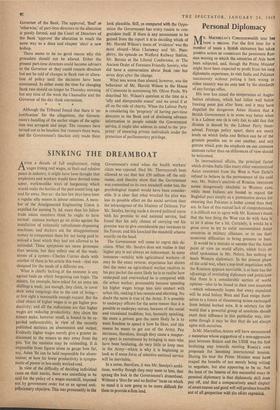Personal Diplomacy
MR. MACMILLAN'S Commonwealth tour has been a success. For the first time for a number of years a British statesman has taken positive action to counteract the passionate Rus- sian wooing to which the countries of Asia have been subjected, and, though the Prime Minister might have been expected to profit from his long diplomatic experience, to visit India and Pakistan successively without putting a foot wrong in either country was no easy task by the standards of any foreign office.
His tour has raised the temperature of Anglo- Indian relations, which had fallen well below freezing point just after Suez; and it may have dispelled the dangerous Asian illusion that a British Government is in some way better when it is a Labour one (it is only fair to add that this illusion is shared by the Labour Party them- selves). Foreign policy apart, there are many levels on which India and Britain can be of the greatest possible use to one another, and any gesture which puts the emphasis on our common interests rather than on differences of view should be welcomed.
In international affairs, the principal factor which divides India (like many other uncommitted Asian countries) from the West is New Delhi's refusal to believe in the permanence of the cold war. Mr. Nehru's analysis of Russian intentions seems dangerously idealistic to Western eyes, while most Indians are bound to regard the Baghdad pact simply as a provocative device for ensuring that Pakistan is better armed than they are. In face of this mutual lack of comprehension, it is difficult not to agree with Mr. Kennan's thesis that the best thing the West can do with Asia is to let it alone for a bit. Certainly, it would be a gross error to try to enlist uncommitted Asian countries in military alliances, or to use their economic difficulties to bring pressure to bear.
It would be a mistake to assume that the Asian point of view on world affairs, which finds its chief spokesman in Mr. Nehru, has nothing to teach Western diplomacy. In the present phase of the cold war, when a top-level negotiation with the Russians appears inevitable, it at least has the advantage of reminding diplomats and politicians that there is a considerable section of world opinion—also to be found in their own countries —which vehemently hopes that every expedient will be tried before West and 'East resign them- selves to a future of threatening noises exchanged from behind barbed wire. It is salutary for the world that a powerful group of countries should exert their influence in this particular way, tire- some though it may be that they do not always agree with ourselves.
In Mr. Macmillan,Asians will have encountered a statesman whose suggestion of a non-aggression pact between Britain and the USSR was the first hesitating step towards meeting Russia's own proposals for lessening international tension. During his tour the Prime Minister must have reaped the benefits of not merely being willing to negotiate, but also appearing to be so. Not the least of the lessons of this successful essay in personal diplomacy is that diplomatic skill does pay off, and that a comparatively small display of sweet reason and good will will produce benefits out of all proportion with the effort expended.


































 Previous page
Previous page